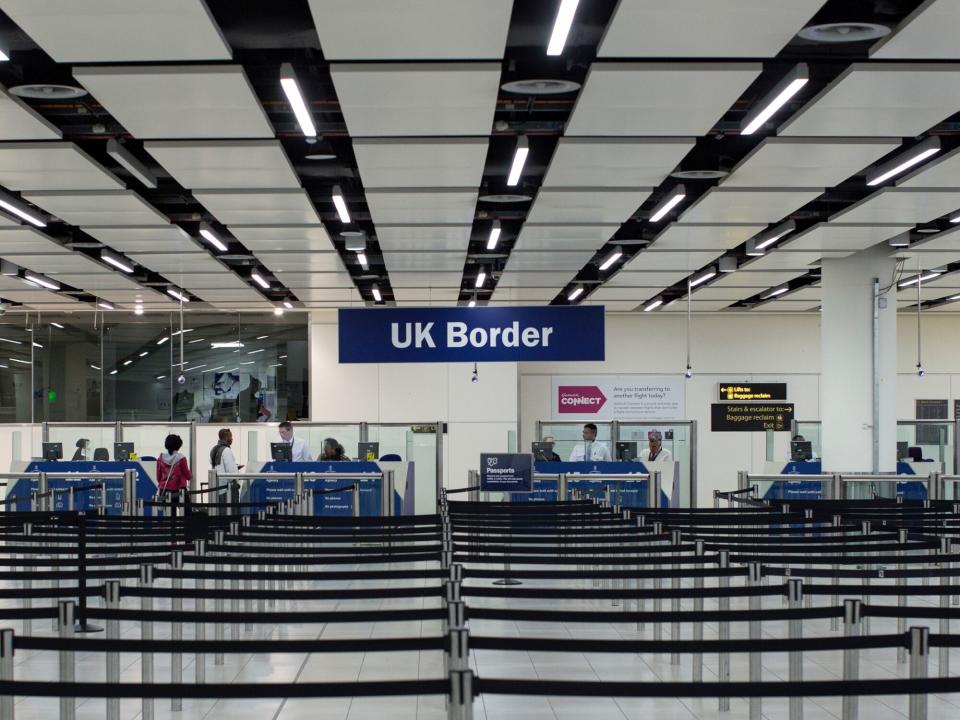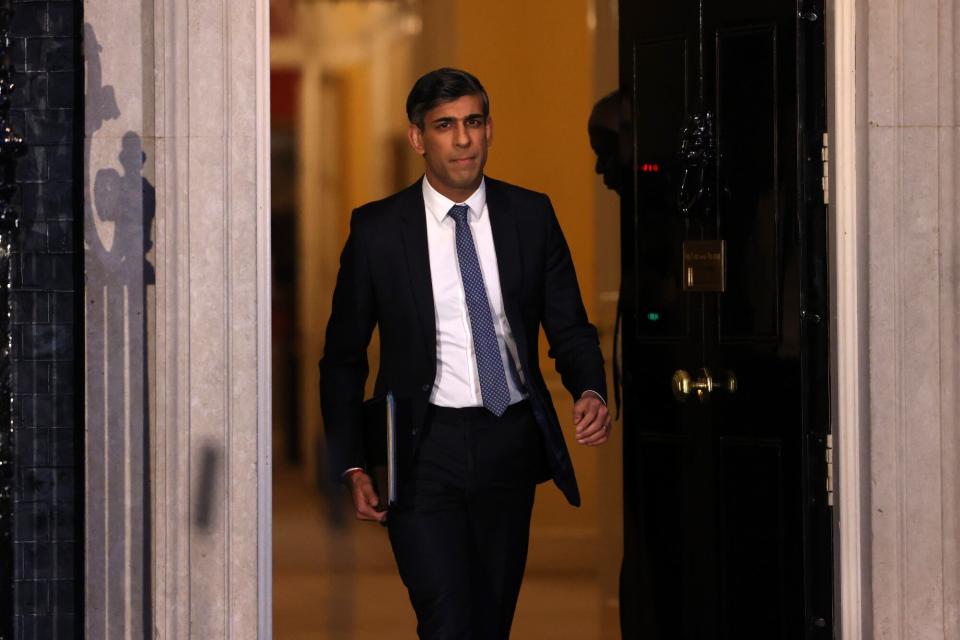UK Weighs Curbs on Chinese Official Visas Over Spy Risk
(Bloomberg) -- Rishi Sunak’s government is considering curbing the number of Chinese nationals who can enter the UK on official business for the People’s Republic and bypass normal visa checks, over fears the system is being abused to bring spies into Britain.
Most Read from Bloomberg
Putin Says Ukraine Deal Requires Security Pledges for Russia
Tesla Gets Tagged With Once-Unthinkable Call: Sales Will Fall
Ex-Wall Street Banker Takes On AOC in New York Democratic Primary
Ministers and security agencies are debating an overhaul of border rules that apply to diplomats and others on so-called official service, people familiar with the matter said, asking for anonymity to discuss private government discussions. The goal is to make China and other nations provide greater detail and allow more time for checks, they said.
Options include limiting how many people can arrive under diplomatic or similar rules, or restricting the scope of official or state-sponsored activities that don’t require a visa, subject to greater advance checks, the people said. The UK’s security agencies support tougher rules to mitigate risk, they said.
The potential clampdown comes amid concern about China’s growing influence in the UK, from university campuses to its involvement in critical industries. A parliamentary committee warned last year Britain’s approach to the national security threat posed by China is “completely inadequate,” with too much focus on short-term economic gains rather than the long-term risks.
More than 20,000 people in the UK have been approached online by Chinese spies, Ken McCallum, head of domestic security agency MI5, said last year. They target professional networking sites such as LinkedIn, to try to cultivate small companies, startup firms and researchers to provide sensitive information.
Still, some British officials said any move to limit diplomatic activities risked inflaming tensions with China at a sensitive time. Sunak has sought to reset ties with the world’s second-largest economy, after a string of disputes over Beijing’s crackdown on dissent in the former British colony Hong Kong and the western Chinese region of Xinjiang.
Both the UK’s Home Office and Foreign Office declined to comment. The Chinese Embassy didn’t respond to a request for comment sent on Tuesday.
Last year, a spokeswoman for the Chinese Foreign Ministry rejected as “entirely groundless” claims the country spies on the UK. “We urge the UK to stop spreading disinformation and stop political manipulation and malicious slander against China,” Mao Ning said in September, in response to the arrest of a parliamentary researcher in London under the Official Secrets Act.
Talks between the security services, Home Office and Foreign Office on entry restrictions are still ongoing, the people said, with a debate about how best to tackle the threat of foreign interference. Official or service passports, which carry greater privileges than regular passports and allow holders to enter many countries without visas or checks, are an obvious place to look, they said.
The number of diplomats accredited to the Court of St. James’s — the historic title given to officials performing genuine diplomatic work — could be unaffected, the people said. Some officials are worried the state service route can be abused by visitors engaged on industrial, trade or academic espionage.
There are prominent members of Sunak’s governing Conservative Party who would welcome a more overtly aggressive stance on China. In 2021, China imposed sanctions on several UK organizations and individuals, including current Security Minister Tom Tugendhat, over what it called the spreading of “lies and disinformation” about alleged human rights abuses in Xinjiang.
For its part, China views control over entry and exit across its borders as a way to shape global opinion, as well as control national security. Approvals to enter are tightly regulated for diplomats, journalists, scholars and business people.
Those known to have been critical of the ruling Communist Party often complain of being refused visas. In January, the Chinese Ministry of State Security accused British intelligence services of using a foreign national to spy on the country, part of a rising pattern of publicizing snares of alleged foreign agents.
However, getting a service passport in China is relatively easy, even when not on recognized government business, said Charles Parton, a senior associate fellow at the Council on Geostrategy think tank who spent more than two decades as a British diplomat working in or on China, Hong Kong and Taiwan.
“China lets a large number of people have a diplomatic or service passports, whereas in the UK diplomatic passports are very controlled and you have to hand them back when not on official business,” he said. “On the one hand, a tightening of the visa regime could sour relations with Beijing, but on the other it could limit how many of its people coming to the UK can hoover up information we want to protect and pass it back to China.”
Beijing uses its extensive state intelligence service to target Britain and its interests “prolifically and aggressively” as it seeks to influence and penetrate every aspect of the British economy, the House of Commons Intelligence and Security Committee said in its report last year.
Peter Mattis, a former CIA agent who is now president of the Jamestown Foundation research group, said China viewed the UK as important place to operate as it seeks to reshape the world order.
“The UK plays an out-sized role in international institutions, global capital flows, and science and technology,” Mattis, a co-author of Chinese Communist Espionage: An Intelligence Primer, said in an interview. “Beijing has an interest not just in knowing about UK academic, government, private sector and civil society institutions, but also in influencing and bending them” to its interests.
One option the UK could adopt is the principle of reciprocity, Mattis said. By only allowing China to use as many official entries as the British government is allowed there, London could restrict Beijing’s intelligence work “without rubbing their face in new restrictions,” he said.
--With assistance from Peter Martin and Alberto Nardelli.
Most Read from Bloomberg Businessweek
Gold-Medalist Coders Build an AI That Can Do Their Job for Them
Academics Question ESG Studies That Helped Fuel Investing Boom
Luxury Postnatal Retreats Draw Affluent Parents Around the US
Primaries Show Candidates Can Win on TikTok But Lose at the Polls
©2024 Bloomberg L.P.



